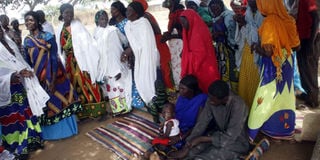Women moral cops of Tana River

The corporal women of Ilwana community sing and move around a couple after punishing the woman for going against their culture and beliefs in this picture taken on May 19, 2019. PHOTO | LABAN WALLOGA | NATION MEDIA GROUP
What you need to know:
- In this community known as Iluana, women are custodians of traditions, law and order and are charged with administering punishment to offenders. They are the community’s moral cops, known as Malakwan.
- On this day, the women, led by trained midwife Fatuma Kulobo, have descended on the home of the offender, Ms Salma Hajji, to punish her for delivering on the roadside while on her way to Bura District Hospital.
- Ms Mohammed says that most punishable cases include men abusing women, backbiting, domestic fights between couples, fornication, adultery, hurling insults at one another, theft, telling lies and disobeying elders’ orders.
Dozens of women, spotting black paint on their faces, sing and dance around a woman as they prepare to mete out punishment for alleged wrongdoing.
The location is Mambo Sasa village, deep inside Bura, Tana River County. The alleged offender is a new mother who went against long-held tradition by defying a midwife and instead attempted to trek to a hospital 80 kilometres away to deliver.
In this community known as Iluana, women are custodians of traditions, law and order and are charged with administering punishment to offenders. They are the community’s moral cops, known as Malakwan.
On this day, the women, led by trained midwife Fatuma Kulobo, have descended on the home of the offender, Ms Salma Hajji, to punish her for delivering on the roadside while on her way to Bura District Hospital.
WOMEN'S AFFAIR
Ms Hajji recently delivered her second child.
“Giving birth in our community is regarded as a women’s affair, we are here to reprimand this woman for not obeying the order to stay in the house and be assisted to give birth since she was due and could not have therefore made it to hospital,” explains Ms Kulobo.
“We are trained by our elders and the government to offer such services and hence our advice should never be disobeyed,” she goes on.
“It is against the law for anyone, including men, to disobey elders’ advice and that is why we are here to punish her since we did not know her motive of moving out of the compound.” According to Ms Kulobo, offenders such Ms Hajji are usually punished by being caned using special itchy sticks known as alesa.
CONCOCTION
Once through with the caning, the Malakwan pour a special concoction comprising of pepper immersed in a liquid mixture, hazina, in the offender’s genitals.
The punishment is usually administered about 30 days after a woman gives birth, but it can be administered instantly for other crimes.
“Caning with alesa is so itchy that offenders never repeat the crime,” says Ms Kulobo, adding that the punishment helps to ensure that women desist from the habit of dumping unwanted, newborn babies on the roadside.
HUMILIATING
“What we see in other towns in Kenya where women dump newborn babies in the bush cannot happen in this village since we keep a record of all pregnant women complete with details of expected delivery dates so as to monitor them closely to avoid such cases,” she explains.
Ms Hajji will be fined Sh5,500 besides the punishment, which must be paid by her husband. “The fine is usually paid by the husband for not ensuring that his wife obeys elders’ orders. The money is used to buy food, which is cooked in the offender’s compound and celebrated by the whole community but the lawbreaker’s family is forbidden from tasting it,” she goes on.
Ms Mwanaharusi Mohammed says the punishment is humiliating. The offender is undressed by the women and sometimes a man pours the hazina into her private parts.
POOR UPBRINGING
“Cases of crime are hardly reported in our community because of the humiliation one experiences during punishment. We have informers and even warn those planning to carry out a crime that they will face cruel punishment,” says Ms Mohammed.
She notes that at times male offenders put up a fight against the Malakwan but they are eventually overpowered.
“When we feel we might meet resistance in punishing a man, we mobilise more women in our community. We can have even more than 100 women to pin down the man.
“No offender, however strong, ever escapes punishment as we are usually well coordinated and they respect that,” she adds.
OFFENCES
Ms Mohammed says that most punishable cases include men abusing women, backbiting, domestic fights between couples, fornication, adultery, hurling insults at one another, theft, telling lies and disobeying elders’ orders.
These, she says, are crimes considered shameful as they lead to poor upbringing of children.
“Once the offender pays the fine and gets punished, we usually conduct special traditional prayers to their families to cleanse them in order to protect them from any misfortunes in future.
“This includes sprinkling the couple with milk directly from a woman’s breasts — that is why we have never had a family getting such punishment twice,” she adds.
The law does not discriminate and hence no offender is spared.
“Even our MCAs, chiefs, the Tana River Woman Representative Rehema Hassan and Tana River Deputy Governor Salim Batuyu, who hail from here, will face the same punishment if they go wrong,” she says.






